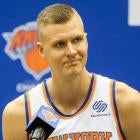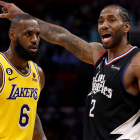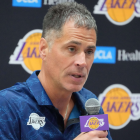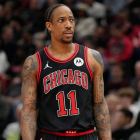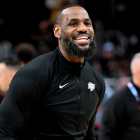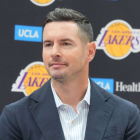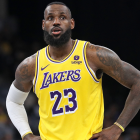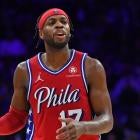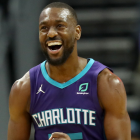Once again, we begin an NBA season where the ending feels like a foregone conclusion from the beginning: The Golden State Warriors are going to win the 2018-19 NBA championship. Thankfully, how the Eastern Conference plays out won't be nearly as predictable.
The top of the East has a chance of being a lot better, and could actually put up a fight in the Finals: The Boston Celtics add a healthy Gordon Hayward and Kyrie Irving to a team that nearly made the Finals last season, the Toronto Raptors add the best two-way player in the game in Kawhi Leonard, and the Philadelphia 76ers have one more year of development with their young studs Joel Embiid and Ben Simmons (and we'll see if Markelle Fultz becomes the young stud he was expected to become).
As they say, the fun isn't always in the destination. It's in the journey. And we have no idea where this NBA season is going to take us.
Here are a few guesses, though: Best-case scenarios and worst-case scenarios for every team in the East.
Are all these scenarios realistic? I think so. At least, all of them except for Dwight Howard suddenly transforming into a Kevin Durant or Anthony Davis. These are mostly best-case/worst-case prophecies. But I try not to get into too much straight-up fantasy.
(Note: We're not counting severe injuries plaguing a team among worst-case scenarios, but we are taking into account players with injury histories.)
For every Western Conference team's best- and worst-case scenario, click here
 Atlanta Hawks
Atlanta Hawks
Best Case: Trae Young proves he really could become Stephen Curry 2.0 -- and he's only 20 years old. Sure, he has his 2-for-13 shooting nights, and his nine-turnover nights, and his getting-bullied-around-on-defense nights, but Young is clearly the first young NBA star molded in the image of Curry. The Hawks modeling themselves after the Warriors works better than even they could have imagined: Kevin Huerter looks like the best three-and-D player out of the 2018 draft, and Omari Spellman's nimble stockiness combines with excellent outside shooting to turn him into a player he's long aimed to be, a poor man's Draymond Green. Taurean Prince continues to progress as a valuable, versatile NBA wing, and John Collins continues to look like one of the biggest steals of the 2017 draft. The Hawks aren't good -- they only win 27 games and are high in the lottery -- but with two more lottery picks in 2019, theirs and the Mavericks', added to this promising core, they appear heading in the right direction.
Worst Case: Young looks overwhelmed playing in the NBA; he jacks too many threes, he makes too many turnovers, he looks like a boy among men. The Hawks' decision to pass on Luka Doncic in favor of Young is dubbed a disaster. Young is forever confident shooting yet barely reliable; Young shooting 33 percent from three isn't what the Hawks' front office had expected when they staked their future on him. The Hawks increasingly give more of Young's minutes to Jeremy Lin as the season goes on, but they spend the entire season preaching patience. The only silver lining in the Hawks' 20-win season is that they are guaranteed one high pick in the draft. The touch of gray in that silver lining is that the 2019 draft isn't a particularly notable one -- and Doncic's ascendance to immediate stardom turns the Mavericks into the NBA's most surprising playoff team, and makes the 2019 pick the Hawks receive from Dallas worth far less.
 Boston Celtics
Boston Celtics
Best Case: The addition of Gordon Hayward to last year's well-rounded roster turns the Celtics into the clear team to beat in the East, for this season and into the foreseeable future. Jayson Tatum continues to grow as one of the top young versatile offensive players in the NBA, while Jaylen Brown continues to grow as one of the top young versatile defenders in the NBA. Kyrie Irving commands the team as a leader and as a scorer, finishing third in MVP and Al Horford anchors a defensive group that's the best in the NBA, winning the Defensive Player of the Year Award. The Celtics make the NBA Finals and lose in a hard-fought 7-game series to the Golden State Warriors. After Kyrie realizes that leaving Boston would be a dumb, dumb idea, he signs a big extension in the offseason with the stipulation that the Celtics must endow a chair at M.I.T. whose sole goal is to investigate the roundness of the earth. The Celtics are picked by Vegas as the favorites to win the title in 2019-20.
Worst Case: Too many cooks in the kitchen, too many star players to fill too few minutes -- and it's all too much for even team chemistry master Brad Stevens to manage. As Tatum and Brown continue to progress into young stars, they steal some of the shine from Irving, who becomes vocally disgruntled by midseason. Horford tries his best to show by example how you must sacrifice for the good of the team, but the egos continue to clash. It all comes to a head during a heated players-only meeting in March. The Celtics do just fine, finishing fourth in the East, but Danny Ainge's carefully laid plans go awry. The Celtics are no longer a prime destination for elite players like, say, Anthony Davis. Adding insult to injury, Irving signs with the New York Knicks in the offseason.
 Brooklyn Nets
Brooklyn Nets
Best Case: The Nets' foundation of young players -- Caris LeVert, Spencer Dinwiddie, Jarrett Allen, Rondae Hollis-Jefferson and D'Angelo Russell -- all take steps forward and look to establish themselves as valuable NBA pieces for a long time. Russell in particular is one of the most surprising success stories in the NBA; he's healthy for the first time since his rookie year, and seems humbled by the bumpy road of his first few seasons in the league. He cuts down on turnovers while scoring an efficient 18 points per game, looking increasingly more like the player he said he was modeling his game after while in college, Manu Ginobili. The Nets improve to 36 wins and even seem like a fringe playoff team at one point. And they end up with two lottery picks, their own plus the Nuggets' as Denver gets the 13th pick, meaning its not protected. The improvement creates a buzz in Brooklyn, and that combines with the Nets' massive amount of cap space to put the franchise in the running for the biggest free agents in 2019. Sean Marks nabs two of the biggest in Kevin Durant and Jimmy Butler. The Nets are contenders for the foreseeable future.
Worst Case: The Nets appear to have a few solid pieces for the future -- notably Allen and LeVert -- but nobody appears ready to take the mantle as the best player on the team. Russell tries, but he continues being the low-efficient and often alienating player he's been during the first few years of his underachieving career. The Nets don't completely tank; they end up with 29 wins, which is unfortunate, since the 2019 draft has a few potential studs in the top five but is not notable for its depth. With little improvement shown from last season to this season, the main pitch Marks can make to free agents is that he can give them a ton of money and the bright lights of the big city. The pitches don't fly, and the Nets end up losing out on every big-name free agent.
 Charlotte Hornets
Charlotte Hornets
Best Case: Kemba Walker has the best season of his career, and the Hornets have their best season since Michael Jordan took over as owner, winning 48 games and getting the sixth seed in a surprisingly tough Eastern Conference. The Hornets' last two draft picks blossom; Malik Monk finds a consistent jump shot and averages 14 points per game on 40 percent three-point shooting, and Miles Bridges looks like a more athletic version of the fellow position-less Michigan State Spartan he models his game after: Draymond Green. Michael Kidd-Gilchrist elevates his defense so much that he nearly makes the NBA all-defensive team, while a healthy Nicolas Batum returns to the do-it-all offensive player he was a year ago. James Borrego's name gets mentioned among the best young coaches in the NBA. The Hornets get bounced in the first round of the playoffs, but Walker re-signs in free agency, and for the first time in a long time, the Hornets appear on a path where the ceiling is something more than just mediocrity.
Worst Case: They're a team with a bunch of guys plus Walker -- which isn't what the All-Star point guard wants, to spend his entire career surrounded by mediocrity. The Hornets are on the lower side of just OK -- not the worst team in the East, but never to be confused with a good team. They spend the entire season on the lower edge of the so-so teams battling for the eighth seed in the Eastern Conference (which, seeing as the eighth seed will go to the first team to win 40 games, isn't something to brag about). None of their past three first-round picks look like smart picks; Frank Kaminsky is just a shooter who gets overwhelmed by other big men's physicality, Malik Monk occasionally heats up but is beset by inconsistency on offense and a lack of effort on defense, and Bridges appears an athlete but not a basketball player. The Hornets aren't any worse than 2017-18 -- again winning 36 games, again being well out of the playoff hunt -- but the problem is they aren't any better. Walker leaves in free agency to a place the offers him a chance to win, and the Hornets reluctantly enter rebuilding mode.
 Chicago Bulls
Chicago Bulls
Best Case: The preseason injury to Lauri Markkanen has no ill effects when he returns in early November. Markkanen builds on his breakout rookie campaign and becomes one of the top outside shooting big men in the NBA, averaging nearly 20 points per game and shooting nearly 40 percent from three. Markkanen and Wendell Carter Jr., who makes the All-Rookie Team, fit together seamlessly, giving the Bulls one of the best young frontcourts in the NBA. On top of Markkanen's success, both Zach LaVine and Kris Dunn find consistent footing as solid NBA starters, with LaVine shoring up his defense (while regaining his excellent three-point shooting of two years ago) and Dunn becoming a much more reliable scorer (while building a reputation as one of the better perimeter defenders in the NBA). For a while, it appears the Bulls could make the playoffs, but they tumble into the lottery by March. Still, a 36-win season, plus a huge amount of progress from the young core, gives Fred Hoiberg job security, and the Bulls go into 2019 free agency -- where they will have a lot of cap space -- with a clear direction for the future.
Worst Case: The preseason elbow injury that knocked out Markkanen for the first month of the season lingers throughout the season, and a year in which he could have progressed into one of the brightest young stars in the NBA becomes a lost season. Other young Bulls also turn in disappointing seasons. Dunn becomes the very good perimeter defender that many projected when he was drafted, but his offensive efficiency is awful, and he's one of the worst guard shooters in the NBA. LaVine's monster contract works out about how plenty of observers anticipated: A massive overpay for an exciting offensive player who is one of the worst defenders in the NBA. Carter looks to have a promising future as a solid two-way NBA big man, but he doesn't appear to have the star potential that the Bulls need from the rookie. Jabari Parker's defense is predictably bad even as he averages 19 points per game. The Bulls finish last in the NBA in defensive efficiency. The franchise is heading in the wrong direction, winning only 24 games and not showing the type of progress one would hope for with this bevy of youngsters.
 Cleveland Cavaliers
Cleveland Cavaliers
Best Case: Things aren't so bad. No, this would never be mistaken for a top-tier team in the East, but Kevin Love returns to something close to to the 26-point, 12-rebound monster he was in Minnesota before settling into a complementary role beside LeBron James. The rest of the team, shed of the pressure and spotlight of playing with perhaps the best player of all time, plays loose and free, finishing in third in an Eastern Conference that's surprisingly strong at the top. Collin Sexton looks like a steal as the eighth pick in the 2018 draft, with his cockiness and explosiveness garnering some comparisons to a young Russell Westbrook. Cedi Osman turns into an elite shooter and a positive developmental story for the Cavaliers. The team isn't poised to win a championship this year or next, but there's a clear direction and way forward for the franchise.
Worst Case: The Cavaliers struggle mightily as they search for an identity in the post-LeBron era. The roster is built around an aging core of players who were recruited solely for their abilities to fit around a LeBron-centered team constructed to win immediately: 30-year-old Love, 32-year-old George Hill, 37-year-old Kyle Korver and 33-year-old J.R. Smith. They appear heading toward a long stint in NBA purgatory as one of those middling, mediocre teams where a sixth-place finish is considered the ceiling -- but never quite be bad enough to grab high draft picks to build a franchise around. Sexton, the rookie lottery pick, has his moments of flash and hubris, but he also seems to be cursed with a weak outside shot, hitting less than 30 percent from three. The Cavs make the playoffs, but a seventh-place finish in an Eastern Conference without much competition at the bottom doesn't exactly inspire confidence in season-ticket holders who'd shelled out big bucks in the hopes of a LeBron return.
 Detroit Pistons
Detroit Pistons
Best Case: The Pistons outperform every expectation. They're nowhere near a top-tier Eastern Conference team, but they are much better than the middling, close-to-.500 team they've been for the past few years. Andre Drummond's three-point shooting experiment works; his 35 percent shooting from three opens up the Pistons' offense and makes new coach Dwane Casey look like a genius. Blake Griffin doesn't return to the high-flying freak athlete of years past, but his athleticism at least appears to be holding steady of the past couple years, and he continues to progress as one of the most well-rounded power forwards in the NBA. Both Drummond and Griffin make the All-Star team and make a case for them being one of the top frontcourts in the NBA. The Pistons are comfortably inside the playoff bubble in the weak Eastern Conference, grabbing the five-seed as the Heat, Bucks and Wizards all falter. The youngsters all fall in line: Stanley Johnson finally lives up to something close to his draft position, Luke Kennard ranks as one of the top three-point shooters in the NBA, Henry Ellenson proves worthy of being at least an NBA rotation player and Khyri Thomas and Bruce Brown both look like second-round steals. The Pistons lose a first-round series to the Indiana Pacers in seven games, but the season is considered an absolute success, with a clear path for bigger successes to come.
Worst Case: Griffin continues to evolve as a shooter, but as he ages he's nowhere near the MVP-caliber player he was a few years ago. Drummond's experiment as a shooter comes to an abrupt conclusion. Reggie Jackson is one of the worst starting point guards in the NBA for the first half of the season until he loses his starting job to Ish Smith. The youngsters falter: Johnson looks like a bust as the eighth pick in 2015, Ellenson continues to not even look like a rotation NBA player, and Kennard appears to be little more than a spot-up shooter. The loss of Anthony Tolliver in free agency stings more than anyone thought it would, and yet the Pistons end up right where we expected: In contention for the eighth seed in March in the weak East. Instead of tanking to try and build for the future, the Pistons go for it, dealing future assets for one more veteran rotation player at the trade deadline. The gambit doesn't work, with the Pistons finishing in ninth. The future looks even worse.
 Indiana Pacers
Indiana Pacers
Best Case: The team doesn't just get one player in the 2019 All-Star Game in Victor Oladipo. They get two, as young big man Myles Turner makes a huge leap in his contract year, averaging 20 points and 10 rebounds, shooting 40 percent from three and finishing in the top 10 in Defensive Player of the Year voting. The Pacers find a way to successfully put Turner and Domantas Sabonis on the floor together; in 2017-18, the two big men only played 269 minutes together and the team posted a minus-6.2 net rating in that time, but this season the two play more than 1,000 minutes together, and both blossom. Also continuing to blossom as a legit NBA superstar is Oladipo. The text message he sent his trainer just minutes after the Pacers lost in the 2017 playoffs -- "When do we start? I'm ready to take it to another level" -- proves prophetic, as Oladipo plays 80 games, averages 25 points and gets votes for both MVP and Defensive Player of the Year. His work ethic sets the tone for the rest of the team, which ranks in the top 10 in both offensive and defensive efficiency and finishes a surprising second in the East. The Pacers make it all the way to the Eastern Conference finals before losing in seven to the Celtics. Before he even walks off the floor, Oladipo sends a text message to his trainer -- "There are at least two more levels for me, MVP and Hall of Fame, let's get it" -- and his confidence buoys the Pacers to use their 2019 cap space to attract an elite free agent. Suddenly, the Pacers are a top-tier team in the East for the foreseeable future.
Worst Case: Stagnation, and a classic case of a team overshooting its expectations one year and undershooting them the next. Oladipo is still the team's best player and still an elite, high-effort perimeter defender, but his steady progress as a shooter -- improving from 32.7 percent from three as a rookie to 37.1 percent last season -- regresses, and the Pacers struggle to create. Offseason additions Doug McDermott and Tyreke Evans hurt the Pacers' defense, while Turner's offseason reshaping of his body doesn't end up reshaping his game. The Pacers are fine, finishing sixth in the East, but the excitement of last season's surprise turns into disappointment at a lack of noticeable progress.
 Miami Heat
Miami Heat
Best Case: Pat Riley gets Jimmy Butler and does it on the cheap, sacrificing neither Justise Winslow nor Josh Richardson, and suddenly the Heat have a legit star again. Butler's presence and Erik Spoelstra's coaching turn what was the NBA's eighth-ranked defense last season into a top-three defense this season. Dion Waiters and Winslow both have injury-free seasons that are the best seasons of their careers, while Hassan Whiteside flips his attitude and returns to the shot-blocking and rebounding behemoth the Heat placed so much faith in when they gave him such a big contract. Wayne Ellington cements his reputation as one of the better three-point threats in the NBA. The Heat finish third in the East, coming one missed three-pointer short of upsetting the Celtics in the Eastern Conference semifinals. Butler falls in love with South Beach (hard not to) and signs an offseason max extension.
Worst Case: A team without a single superstar player becomes just another middling team battling with a bunch of other middling teams to sneak into that final spot in the Eastern Conference playoffs. Whiteside becomes a poisonous presence on the court and in the locker room and is dealt for pennies on the dollar (not to mention cap relief) before the trade deadline. Waiters and Winslow can't stay healthy, Ellington and Richardson take steps backwards, Goran Dragic looks like he's past his prime and Dwyane Wade's prime feels like an eon ago. Spoelstra can't coax anything special out of a team that has plenty of depth but no star power. The only beautiful moment is when LeBron's Lakers come to town, and the Heat and LeBron give Wade a special sendoff gift to commemorate those titles: A gold-plated banana boat. LeBron re-gifts it to Wade, figuring Wade will have more time on his hands to sail the high seas.
 Milwaukee Bucks
Milwaukee Bucks
Best Case: It all comes together, with new head coach Mike Budenholzer coaching the hell out of this Giannis-led group. The Bucks are the surprise of the NBA, finishing third in the East. Giannis Antetokounmpo takes yet another step forward, becoming the first Milwaukee Buck to win an MVP award since Kareem Abdul-Jabbar in 1973-74, and the Bucks' 12-game improvement -- not to mention the team turning its 21st-ranked defense of 2017-18 into a top-10 defense -- wins Budenholzer the Coach of the Year award. Khris Middleton makes his first All-Star appearance. The seven-game first-round playoff loss to the Celtics in 2018 proves a harbinger of a group of players filled with fight. Giannis realizes this team is building toward something special, and he says at the press conference following the Bucks' loss in Game Six of the Eastern Conference finals that he plans to stay in Milwaukee for the entirety of his career.
Worst Case: Despite his reputation as a defensive wizard, Budenholzer can't get through to his players to get them to shore up their defense, and the Bucks stay in the bottom third of the NBA in defensive rating. That prevents them from even sniffing the top tier in the Eastern Conference. Giannis' three-point shooting takes a step backwards as his 25 percent mark from three makes defenders sag off him. By midseason, he's avoiding shooting threes almost entirely. That underscores the team's anti-modern approach to shooting that had the Bucks rank 25th in the NBA in three-point attempts last season and 20th in three-point percentage. Entering April, a playoff berth hangs in the balance. They sneak into the playoffs with a .500 record, but a team with so much promise going into the season suddenly seems heading in the wrong direction. Murmurs of Giannis leaving in a couple years bubble up; a popular guess is Dallas, where Giannis' brother Kostas has made a surprising amount of progress, and made the Mavericks' roster.
 New York Knicks
New York Knicks
Best Case: Hear me out: The best-case scenario is … for the Knicks to be the worst team in the NBA. Look, this team is going to be terrible with Kristaps Porzingis out with a torn ACL. The worst thing that could happen would be for the Knicks to be within striking distance of the eight seed in the weak Eastern Conference in early February and for Porzingis to feel pressured to speed up his return from the injury -- and then get injured again. Instead, the Knicks consider this a lost year in terms of the playoffs, with the only importance being how the Knicks can position themselves for 2019-20 and beyond. Frank Ntilikina makes a positive leap forward offensively in his second season in the league while proving to be an elite perimeter defender, and rookies Kevin Knox and Mitchell Robinson both look like steals at their respective draft positions. Emmanuel Mudiay and Mario Hezonja look rejuvenated in their new home and prove that they are capable of being NBA rotation players. Porzingis looks great in limited minutes when he returns in March. The Knicks only win 23 games, but most of that is because the youngsters are given the chance to fail. With the No. 1 pick in 2019, the Knicks have their choice between three future stars from Duke -- R.J. Barrett, Cameron Reddish or Zion Williamson -- and then use their cap space to nab a max-contract player in 2019 free agency (ahem, Kevin Durant). Suddenly, the Knicks look like they will be contenders in the East for years to come.
Worst Case: The Knicks are … not terrible, but never to be confused for good. They're not in the playoff hunt. But they're not at the bottom of the East. Ntilikina continues to be a defensive stopper but shows little progress on offense. The summer league success of Kevin Knox and Mitchell Robinson seems like a mirage. The offseason fliers the Knicks took on Mudiay and Hezonja pay zero dividends, and the Knicks win 33 games on the backs of veterans, relying on players no franchise would ever consider foundational: Enes Kanter, Courtney Lee and Tim Hardaway. Porzingis rushes his return in February in an ill-advised playoff push, and he looks like he isn't ready, with effects from his injury lingering. The Knicks get the 10th pick in a 2019 draft that has little depth. Free agents avoid Madison Square Garden like the plague.
 Orlando Magic
Orlando Magic
Best Case: The Magic's length and athleticism up front turn them into a young version of the Utah Jazz. The Magic leap from the 20th-ranked defense in the NBA last season all the way into the top 10. Rookie Mo Bamba is still a work in progress on offense, but his defense is Rudy Gobert-like, and he averages 2.5 blocks per game. Lineups that include Bamba, Jonathan Isaac and Aaron Gordon are among the better defensive lineups in the NBA. Isaac's lost rookie season turns into a sophomore campaign that is full of promise; he makes threes at an above-average rate, and his defense is aggressive and athletic. Gordon continues his evolution from pure athlete to well-rounded basketball player, even garnering some mid-season buzz as a potential All-Star. While the lack of effective point guard play limits the Magic's ceiling, they still win 34 games and boast a young core that appears poised to develop into one of the top defenses in the NBA.
Worst Case: The lack of effective point guard play hinders the development of Orlando's young, potential-filled frontcourt. While the defense is slightly above average, the team simply can't create buckets. It's an ugly sight to watch as the NBA's 25th-ranked offense last season turns into the league's bottom-ranked offense. The Magic finish with 22 wins, second-worst in the league. A top-five pick in 2019 is unable to shore up their key need as the 2019 draft is light on elite point guards.
 Philadelphia 76ers
Philadelphia 76ers
Best Case: Sam Hinkie's sacrifice turns into the Sixers redemption. The Process is considered complete as the 76ers sweep the Raptors in a four-game Eastern Conference finals. Amir Johnson's preseason words to CBS Sports HQ about Joel Embiid -- that he's noticeably improved since the end of last season -- prove prophetic. Embiid's prophecy about himself comes true as he wins the MVP award. More importantly, the whole team is healthy. Embiid, Ben Simmons and Markelle Fultz all play in 75 or more games. Simmons finishes fifth for MVP while Fultz wins the award for Most Improved Player; his jump shot returns to how it looked in college, and his playmaking gives credence to why the 76ers traded up to get him in the 2017 draft. All the questions about Fultz's injuries and shooting mechanics and possible yips feel like ancient history, and pretty silly in retrospect. The 76ers make the NBA Finals and lose in a hard-fought six-game series to the Golden State Warriors, but the excitement around the team turns the 76ers into a prime destination for 2019 free agents. The 76ers erect a statue of Sam Hinkie in front of the Wells Fargo Center.
Worst Case: Injuries, injuries, injuries. And not just freaky, Gordon Hayward-esque injuries either. The team is beset by recurrences of the same injuries that cost its three young stars -- Embiid, Simmons and Fultz -- entire seasons or large chunks of seasons over the past few years. With those three playing a total of 100 regular-season games, the Sixers embarrassingly miss the playoffs in a weak Eastern Conference. Meanwhile, Jayson Tatum -- the player the Sixers could have selected in 2017 instead of Fultz -- turns into a go-to scorer for the Celtics, averaging 20 points per game for a Celtics team that runs away with the East.
 Toronto Raptors
Toronto Raptors
Best Case: The only team in the NBA to rank in the top five in both offensive and defensive efficiency last season (second in offense, fifth in defense) somehow gets even better. The subtraction of DeMar DeRozan and his miserable defense combined with the addition of Kawhi Leonard and his elite defense turns the Raptors into the NBA's top-ranked defense. The Raptors make the NBA Finals and lose in a hard-fought six-game series to the Golden State Warriors. Kawhi is perfectly healthy and wins both the MVP award and Defensive Player of the Year Award; he's strangely enchanted by Toronto's standing as a world-class city, crippling winters and all, and in the first emotional press conference of his life after the Raptors' Game 6 overtime loss, he confesses his unexpected love for this franchise and this city. He announces he'll sign a supermax with them in the offseason and that no one else should come knocking. The Raptors young core of Fred VanVleet, OG Anunoby and Pascal Siakam all show progress on offense and play key roles on the Raptors' elite defense, while Kyle Lowry shows no sign of aging. The Raptors are picked by Vegas as the favorite to win the title in 2019-20.
Worst Case: That Kawhi thing? By the time of Toronto's first foot-high snowfall in mid-November, it's clear that this thing isn't working out. His quad injury lingers throughout the season, hampering his athleticism and turning a guy who'd been a top-three NBA player into a top-30 NBA player. With Leonard taking less of an offensive burden than expected, more of it falls to Lowry, and by March the minutes load is taking its toll on Lowry. Serge Ibaka continues his fall toward becoming a really expensive, barely relevant player, while Anunoby and Siakam become liabilities on the offensive end. Worse still, over in the Western Conference, the San Antonio Spurs are flying high, with DeRozan playing capable defense while continuing to expand his offensive arsenal beyond the three-point line and Jakob Poeltl continues his ascension as one of the best young big men around the rim in the NBA, as Poeltl again leads the league in true shooting percentage. Kawhi leaves in the offseason, and general manager Masai Ujiri begins a rebuilding process to reshape the team in his own image.
 Washington Wizards
Washington Wizards
Best Case: Superman is Superman again. Dwight Howard's career, which has been on a downward trajectory since he left Orlando six seasons ago, takes a step back in time as Howard fills the major void the Wizards have had at center for years. Howard's trainer's prediction that he could evolve into an Anthony Davis or a Kevin Durant turns out to be less ridiculous than it seemed. (In a column filled with implausible scenarios, this part feels like straight fantasy.) More importantly, the locker room doesn't turn on Howard as he shows his teammates that he's actually grown up. John Wall and Bradley Beal both make the All-Star team, Kelly Oubre makes a case as one of the most improved players in the NBA, and the Wizards host a first-round playoff series.
Worst Case: One of the NBA's most combustible locker rooms absolutely explodes. Teammates sour on Howard quickly. The rest of the team quickly becomes frayed as well. A split develops between Beal and Wall as Wall begins to regress in his age-28 season while Beal continues his All-Star production. One of the NBA's worst salary cap situations looks a little bit worse. The $170 million Wall is owed over the next four seasons feels like an albatross that will sink the franchise into continued mediocrity.









